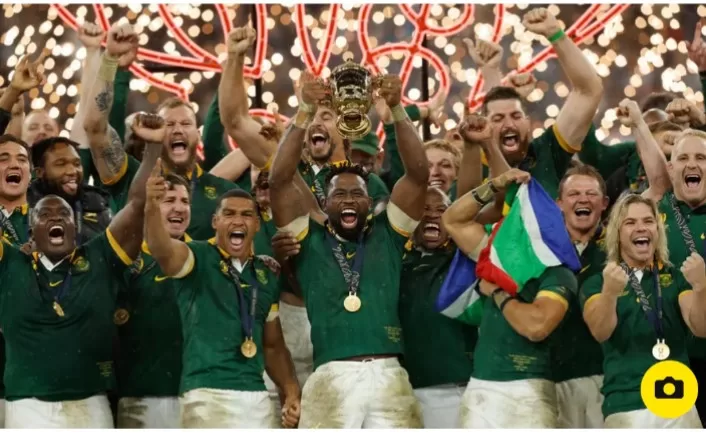In an electrifying culmination, South Africa emerged triumphant in the Men’s Rugby World Cup final against New Zealand, marking a historic defense of their title. The contest unfolded in a tempestuous Parisian setting, signifying a momentous occasion and temporarily quelling debates about the world’s most dominant rugby nation.
The epic encounter will be etched in memory as a tale of two captains. Siya Kolisi, South Africa’s trailblazing black rugby captain, reprised his role as a symbol of inspiration. In a striking parallel to the moment he hoisted the Webb Ellis Cup in Japan four years ago, Kolisi once again celebrated a resounding victory. Conversely, for Sam Cane, the captain of the All Blacks, it evolved into an agonizing night of regret.
The teams remained evenly matched until the pivotal moment when Cane was handed a red card after a video review for an upright tackle on Jesse Kriel in the 27th minute. Although more severe tackles have been observed in the past, the usage of the phrase “a high degree of danger” left no room for clemency. Notably, this was the first instance of a player being sent off in a World Cup final, let alone a captain of the All Blacks.
The high-octane drama continued as Kolisi, too, received a yellow card five minutes into the second half for a head-high contact with Ardie Savea. This incident spurred the 14-man New Zealand team into a frenzied comeback. The All Blacks appeared to secure a “try” courtesy of scrum-half Aaron Smith, only to have it disallowed due to a knock-on by Savea in the buildup. However, they managed to score a legitimate try through Beauden Barrett just before the hour, setting the stage for a thrilling conclusion. In the dying moments, Jordie Barrett missed a long-range penalty attempt, sealing South Africa’s triumph.
Among the spectators in the stands, tennis luminaries Roger Federer and Novak Djokovic bore witness to this gladiatorial contest. The Springboks, led by Handré Pollard’s impeccable kicking and the relentless Pieter-Steph du Toit, who recaptured his form that had earned him the title of world player of the year in 2019, became only the second men’s team, following New Zealand in 2015, to secure successive World Cup titles.
The atmosphere was palpable, as the two fiercely proud rugby nations, with a 102-year history of competitive encounters, faced off. Rain drenched the Parisian scene, further intensifying the spectacle. Notably, the slippery ball posed a significant challenge for New Zealand, potentially leading to more handling errors and scrums. South Africa’s affinity for scrummaging was evident, a skill that had unnerved England in a previous match. Prior to Barrett’s try, the Springboks had never conceded a try in three World Cup finals.
Remarkably, South African tenacity emerged as the decisive factor once again. They navigated all three of their knockout games, winning by a solitary point, defying various adversities. Notably, their hooker Bongi Mbonambi’s early departure due to an injury sustained in a contentious tackle further compounded their challenges. Shannon Frizell’s tackle on Mbonambi, captured in slow motion, sparked concerns. Consequently, South Africa turned to the 37-year-old Deon Fourie to fill the void, adding to Mbonambi’s challenging week.
In the early stages, South Africa enjoyed territorial dominance, earning two penalties through the precision kicking of Pollard. New Zealand, however, raised the tempo, with Savea narrowly missing a clever attacking chip from Jordie Barrett. Aside from Richie Mo’unga’s successful penalty kick, the All Blacks were unable to find a breakthrough. Pollard, echoing his performance against England, delivered a sublime long kick to extend his team’s lead.
Nonetheless, New Zealand’s composure wavered, leading to lineout errors and eventually Cane’s costly transgression. This allowed South Africa to secure a turnover penalty, which Pollard converted to extend the advantage. Facing a 12-6 deficit at halftime, New Zealand’s task became increasingly challenging, as no team had ever come from behind at halftime to win a Men’s Rugby World Cup final.
With Kolisi’s departure from the field, the momentum swung once again, and New Zealand launched a spirited resurgence. Despite turning down kickable penalties to pursue tries, the All Blacks’ persistence paid off when Mark Telea found space on the left, setting up Beauden Barrett’s try. The final quarter unfolded in breathtaking fashion, compounded by Cheslin Kolbe’s sin-binning by referee Wayne Barnes for a deliberate knockdown.
In conclusion, the tournament, though not without its imperfections, featured exhilarating matches that rivaled the best in sports. South Africa can now revel in the ultimate glory, while the northern hemisphere, with only one World Cup victory in ten attempts, faces a significant gap in the quest for rugby supremacy.




